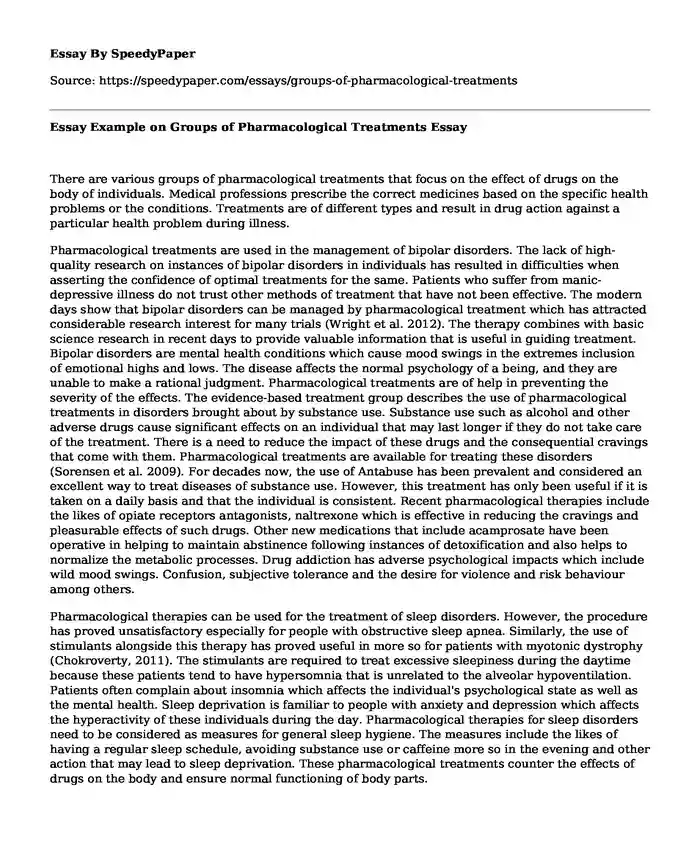
| Type of paper: | Critical thinking |
| Categories: | Pharmacology |
| Pages: | 3 |
| Wordcount: | 611 words |
There are various groups of pharmacological treatments that focus on the effect of drugs on the body of individuals. Medical professions prescribe the correct medicines based on the specific health problems or the conditions. Treatments are of different types and result in drug action against a particular health problem during illness.
Pharmacological treatments are used in the management of bipolar disorders. The lack of high-quality research on instances of bipolar disorders in individuals has resulted in difficulties when asserting the confidence of optimal treatments for the same. Patients who suffer from manic-depressive illness do not trust other methods of treatment that have not been effective. The modern days show that bipolar disorders can be managed by pharmacological treatment which has attracted considerable research interest for many trials (Wright et al. 2012). The therapy combines with basic science research in recent days to provide valuable information that is useful in guiding treatment. Bipolar disorders are mental health conditions which cause mood swings in the extremes inclusion of emotional highs and lows. The disease affects the normal psychology of a being, and they are unable to make a rational judgment. Pharmacological treatments are of help in preventing the severity of the effects. The evidence-based treatment group describes the use of pharmacological treatments in disorders brought about by substance use. Substance use such as alcohol and other adverse drugs cause significant effects on an individual that may last longer if they do not take care of the treatment. There is a need to reduce the impact of these drugs and the consequential cravings that come with them. Pharmacological treatments are available for treating these disorders (Sorensen et al. 2009). For decades now, the use of Antabuse has been prevalent and considered an excellent way to treat diseases of substance use. However, this treatment has only been useful if it is taken on a daily basis and that the individual is consistent. Recent pharmacological therapies include the likes of opiate receptors antagonists, naltrexone which is effective in reducing the cravings and pleasurable effects of such drugs. Other new medications that include acamprosate have been operative in helping to maintain abstinence following instances of detoxification and also helps to normalize the metabolic processes. Drug addiction has adverse psychological impacts which include wild mood swings. Confusion, subjective tolerance and the desire for violence and risk behaviour among others.
Pharmacological therapies can be used for the treatment of sleep disorders. However, the procedure has proved unsatisfactory especially for people with obstructive sleep apnea. Similarly, the use of stimulants alongside this therapy has proved useful in more so for patients with myotonic dystrophy (Chokroverty, 2011). The stimulants are required to treat excessive sleepiness during the daytime because these patients tend to have hypersomnia that is unrelated to the alveolar hypoventilation. Patients often complain about insomnia which affects the individual's psychological state as well as the mental health. Sleep deprivation is familiar to people with anxiety and depression which affects the hyperactivity of these individuals during the day. Pharmacological therapies for sleep disorders need to be considered as measures for general sleep hygiene. The measures include the likes of having a regular sleep schedule, avoiding substance use or caffeine more so in the evening and other action that may lead to sleep deprivation. These pharmacological treatments counter the effects of drugs on the body and ensure normal functioning of body parts.
References
Chokroverty, S. (2011). Sleep and breathing in neuromuscular disorders. In Handbook of clinical neurology (Vol. 99, pp. 1087-1108). Elsevier.
Sorensen, J. L., Hettema, J. E., & Larios, S. (2009). What is evidence-based treatment?. In Evidence-based addiction treatment (pp. 1-20).
Wright, P., Stern, J., & Phelan, M. (Eds.). (2012). Core Psychiatry E-Book. Elsevier Health Sciences.
Cite this page
Essay Example on Groups of Pharmacological Treatments. (2022, Aug 24). Retrieved from https://speedypaper.com/essays/groups-of-pharmacological-treatments
Request Removal
If you are the original author of this essay and no longer wish to have it published on the SpeedyPaper website, please click below to request its removal:
- The Process of Inspiration, Free Essay Sample
- Free Essay Sample on Spiritual Wellness
- Free Essay Sample on GIS Presentation
- Free Essay: Reader Response of Odyssey by Homer
- Free Essay: Ethical and Legal Issues in Provision Healthcare Services for Children
- Crusades and Islamic Sicily, Free Annotated Bibliography Sample
- Euthanasia - Free Paper Example
Popular categories




